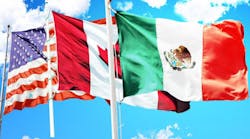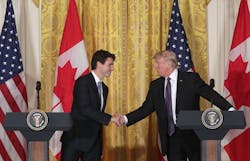Authors: Josh Wingrove and Eric Martin
Negotiations to modernize NAFTA are in their sixth round with few signs of a breakthrough, even as President Donald Trump continually applies pressure by threatening to withdraw if the U.S. can't get its way.
Canada and Mexico are reluctant to give in, and say some U.S. demands to shrink its trade deficit would cause more harm than having no North American Free Trade Agreement at all.
But with political pressure building for talks to wrap up in coming months, one side will have to give in soon. To show just how difficult it could be to have successful negotiations, the tables below describe the five most contentious American proposals -- described by the U.S. Chamber of Commerce as poison pills -- and where Canada and Mexico stand.
Cars
For Trump, a major focus in NAFTA is the automobile industry, which has taken advantage of the tariff-free zone by building a supply chain throughout North America, with a heavy manufacturing presence in Mexico where labor is cheaper.
In a bid to revive U.S. factories, the White House has proposed raising the so-called automotive rules of origin, which is the minimum threshold of a vehicle or part that must come from the NAFTA region to be traded under the pact. It wants to raise it to 85% from 62.5%; add a U.S.-specific requirement of 50%; and expand the so-called tracing list that would raise paperwork requirements but also expose modern parts that are foreign, but are being counted as domestic under the current pact.
Automakers warn the proposals would upend supply chains.
| Canada: |
It could probably live with a modest increase in the rules of origin. Its biggest argument is that it thinks the U.S. proposal will hurt the industry in all three countries, and help foreign automakers. |
|
Mexico:
|
It could accept tighter rules of origin, but probably not a U.S.-specific requirement -- and certainly not 50%. |
|
Latest Status:
|
The issue is due for discussion during the current talks in Montreal, though Mexico and Canada weren't preparing formal counter-proposals. |
Sunset Clause
|
Canada:
|
Proposed an automatic review of NAFTA, though it remains opposed to any automatic termination clause. |
|
Mexico:
|
Proposed a regular review of the pact that would stop short of an automatic termination clause. |
|
Latest Status:
|
The U.S., in its latest list of objectives, said it was only seeking "a mechanism for ensuring that the parties assess the benefits of the agreement on a periodic basis," making no mention of a sunset clause. But Canadian and Mexican negotiators say the Americans continue to privately push for it. |
NAFTA has a trio of mechanisms known as chapters 11, 19 and 20 that allow multinational panels to resolve disputes. The U.S. wants to water down chapters 11 and 20, and kill 19 altogether. This is an old dispute -- Chapter 19 was a last-minute addition to the original Canada-U.S. trade talks that preceded NAFTA. Canada has staunchly defended it ever since.
|
Canada:
|
This is arguably the biggest deal-breaker for Ottawa. Canada has said it doesn't need Chapter 19 exactly in its current form, but wants a way to settle disputes impartially. |
|
Mexico:
|
It favors maintaining the key elements of the current mechanisms but says it would support improved procedures that strengthen them. |
|
Latest Status:
|
The path forward for dispute settlement is unclear. Canada is using Chapter 19 to mount challenges of U.S. tariffs on softwood lumber. |
|
Canada:
|
This is another major sticking point for Canada, which says America's proposal would leave Canadian firms with less access to the U.S. economy than many nations who trade virtually nothing with the U.S. |
|
Mexico:
|
Mexico countered by proposing to cap the value of contracts awarded to American companies to the same amount that Mexican firms get in the U.S. Since American firms do more business in Mexico, it would mean less business for U.S. companies. |
|
Latest Status:
|
It's not currently a major point of discussion. |
Agriculture
The Trump administration is making an aggressive push to protect American farm products. One proposal would restrict imports of certain crops during the U.S. growing season, which would hurt Mexican growers. The U.S. also wants to undo Canada's supply management system, which is a series of production quotas and tariffs for dairy, poultry and eggs.
|
Canada:
|
Canada says it won't agree to dismantling its dairy system, period. But it agreed to open up fractions of its market in previous deals -- the Trans-Pacific Partnership opened up 3.3% of the dairy market. |
|
Mexico:
|
It has objected to the proposal that would hurt exports including tomatoes and avocados. |
|
Latest Status:
|
There are no signs of major movement, and Canada's chief negotiator pledged on Jan. 23 to defend supply management. |















